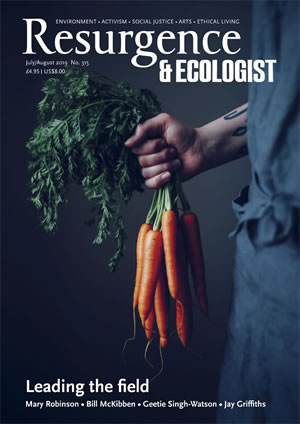The problem is all too horribly familiar: human conflict, injustice and inequality as bad as they have ever been, with the added, unprecedented disaster of ecological collapse – mass extinction and climate breakdown. The causes are multifarious, but at the root of all is the loss of values, which in practice are made manifest through the virtues – and in particular, at least on the world stage, of the virtues that hold society together: compassion, generosity, kindness and justice.
Materialism prevails, made manifest in the neoliberal economy that now dominates, in which all value is measured in money. The natural world is reduced to ‘natural capital’ and ‘ecosystem services’, and nations, companies and individuals alike are in effect obliged to compete in the global market with all the others, to become richer. We are, says Timothy Gorringe, already in a dark age. Indeed, he asks, can we, humanity, survive at all in a recognisable and tolerable form if we don’t act now?
But what’s to be done? The greatest hope, he says – in line with Naomi Klein and others – lies with social movements, of which, worldwide, there are a great many. Social movements are not necessarily campaigns seeking to challenge authority head-on. Rather, they are “prefigurative”, and between them the members show the world that life can be different – “the world made otherwise”. Gorringe himself is a keen supporter (though also a critic) of the Transition town movement that was begun by Rob Hopkins of Totnes, Devon in 2006. Initially, its aim was to find alternatives to fossil fuels, and now it is spreading worldwide with a far wider brief. The problem, though – the paradox, indeed – is that, ultimately, it is difficult if not impossible to make any tangible impact on the status quo without political and (some) economic power; and the qualities that we need to restore society and the world to a viable and tolerable state – compassion, humility, generosity – are not the kind that lead to power. The qualities that do lead to power – materialism, acquisitiveness, aggression – are precisely the kind that are threatening to kill us all. In the end, if we truly want to rescue the world, we need the good attitudes and practices that are now being nurtured in social movements to become the norm. But how can these movements and the values they espouse achieve the means to bring about on-the-ground change without becoming aggressive and hierarchical – the very traits that we seek to avoid?
Gorringe’s book is wonderfully scholarly (as many in this field are not) but also very readable. Most of all he recognises the breadth of the challenge, and that nothing worthwhile can be achieved ad hoc. He explores the facts of the case – ecology and sociology and the political ideas and economics that have brought us to our present state. Perhaps most importantly of all, he looks at the underlying moral principles that apparently have led us, and certainly the people in charge, to accept the status quo. The point, as his book title suggests, is that there is nothing inevitable about the world’s present plight. It could be otherwise if we really wanted it to be and were prepared to grasp the various nettles.
A professor of theology, Gorringe places great store by religion, with particular emphasis on Christianity (though certainly not to the exclusion of all others). He asks, can Christianity itself properly be seen as a transition movement? He concludes that it certainly can. But, he says, Christianity should be an egalitarian, inclusive, combined endeavour to create an alternative and more benign world, not the authoritarian, hierarchical, top-down institution that the established Church has so often become. In his hands, Deuteronomy and the mysterious book of Revelation emerge as truly wise and indeed prophetic texts with a great deal to say to the modern world. Overall, The World Made Otherwise is an excellent book that surely should be numbered among the classics.
Postscript: Gorringe doesn’t say so directly, but I suggest we’re just not angry enough. What is happening to humanity and the biosphere right now is criminal: in practice, a minority are directing the world for their own ends, either without giving thought to the collateral damage, social and ecological, or – which may be worse – by employing intellectuals to find arguments, economic, scientific, legal and spuriously moral, to justify their attitudes and their actions. Those intellectuals should be ashamed of themselves, but alas, they don’t seem to be.







